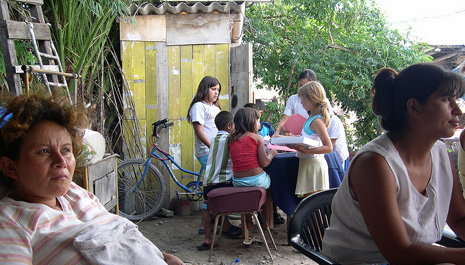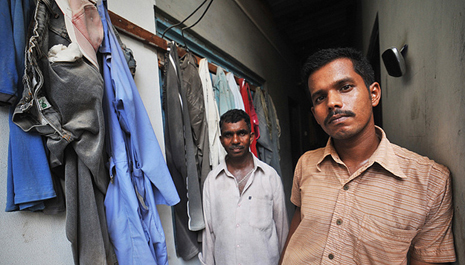Development
(Research papers and policy briefs below)
History tells us that migration has been an essential ingredient of growth and development of many countries. However, the current migration and development discourse has focused attention on a few features of migration characterized as development links, and it has generally addressed the origin country side of the equation. This migration-development discussion often omits the key role and contribution of international labour and skills mobility that enables, sustains and advances economic and social development of destination countries. Lack of consensus on what is meant by the term 'development' and inadequate engagement of contemporary development actors compound the lacuna.
Nonetheless, economic, labour market and social trends suggest that migration today is a crucial element for economic growth and development in migrant destination/employment countries. For example, there is increasing evidence on job creation, business expansion and even differential GDP growth directly attributed to international migrant/immigrant presence in host countries.
Not addressing the full migration-development paradigm risks underestimating migration—labour and skills mobility—as a primary factor for economic integration, and thus an engine for promotion of growth and social welfare in destination countries. Misunderstanding this paradigm leads to perceiving and acting on migration as a problem of national security, a threat to employment and welfare of 'nationals,' a challenge to social and national cohesion, an economic and social cost,among other issues. Responses thus tend to focus on nationalist and restrictive policy formulations, this precisely when circulation of nearly all other aspects of economic and commercial activity—capital, goods, services, technology, knowledge—are necessarily internationalized and liberalized. And despite World Bank predictions that liberalizing global circulation of skills and labour would make a much greater contribution to world economic growth than the liberalization of trade.
Ultimately, consequences of misunderstanding the development-migration nexus result in reduced global welfare, violations of rights of persons, reduced productivity, lost opportunities for economic growth and development, and social disruption.
GMPA endeavours to conduct research to promote a fuller global understanding of the development-migration links r to elaborate appropriate policy and practice and ensure that migration indeed contributes fully to economic and social development both in the North and the South.
Documents and Papers
- Migration, Human Rights & Sustainable Economies: A Century 21 Agenda. P. Taran (2022), Revista Tecnológica - Espol.
- Migration and diasporas: What role in home country development? P. Wickramasekara, 2022 (in Routledge Handbook of Immigration and Refugee Studies)
- Common Home: Migration and Development in Europe and beyond. Caritas Europa-GMPA, 2019.
- Common Home: Migration and Development national studies covering: Austria, Belgium, Bulgaria, Czech Republic, Germany, Italy, Netherlands, Portugal, Slovakia, Slovenia, and Sweden, 2019.
- Andean migrant associations' host and home country engagement: lessons from the cantons of Geneva and Vaud, Switzerland, V. Castillo Rueda, 2019 (Doctoral Thesis, UNIGE)
- The Sustainable Development Goals and Migrants/Migration Matrix V3.4 GMPA 2018.
- Migration, Development, Integration & Human Rights: Global Challenges in the 21st Century. Taran, 2018.
- Engaging the Diaspora and Migrant Workers for Home Country Development: Diaspora Finance and Remittances. P. Wickramasekara, E. Tennant & P.Taran (2018). ADBI – OECD – ILO.
- Migration, development and governance: labour and skills mobility, international standards and comprehensive migration policy for Taiwan. Taran, 2018.
- Regional mobility, freedom of movement and integration: integral to sustainable development and governance worldwide; Contemporary political-economic challenges, contentions and responses. Taran, 2018.
- Promoting better regional cooperation towards smart and humane migration across the Mediterranean: Rapporteurs Summary Statement. Taran, 2017.
- The Sustainable Development Goals and Migrants/Migration Regarding the UN 2030 Sustainable Development Agenda: Relevant SDGs and Targets, Rationales for Inclusion, Implementation Actions, and Realization Measurement Indicators. GMPA, 2017.
- Mainstreaming Migration in Development Agendas: Assessment of South Asian Countries, WICKRAMASEKARA, 2015.
- GMPA Views on Proposed Targets for the post-2015 Development Agenda Regarding International Migration, GMPA, 2014.
- Etat des lieux des associations de migrants des Cantons de Genève et Vaud, V. Castillo Rueda & I.Obadiaru, 2012. FGC & FEDEVAC.
- Rethinking Development and Migration: Some Elements for Discussion, TARAN, 2011.
- L'engagement des associations de migrants dans le développement du pays d'origine : cas d'étude : les projets de codéveloppement entre l'Espagne et la Colombie, V. Castillo Rueda, 2009. (MA Thesis, IHEID)
- Diasporas and Development: Perspectives on Definitions and Contributions, WICKRAMASEKARA, 2009.





